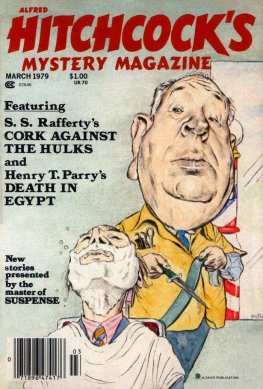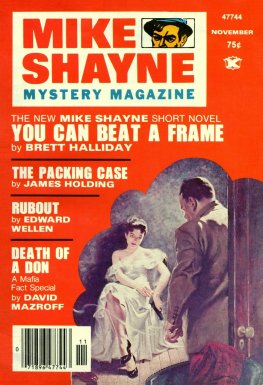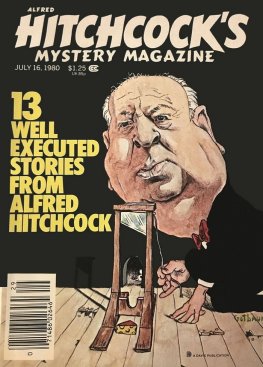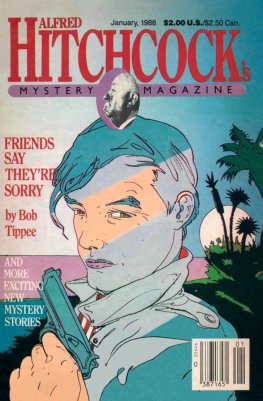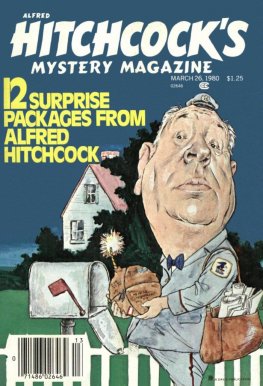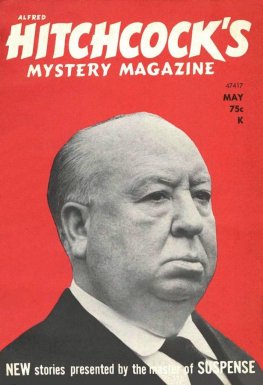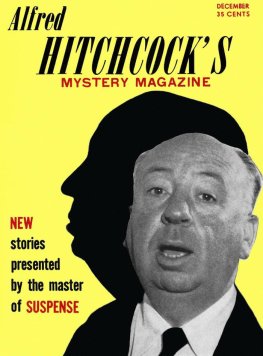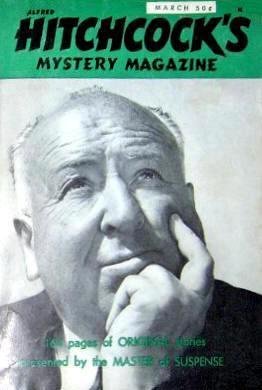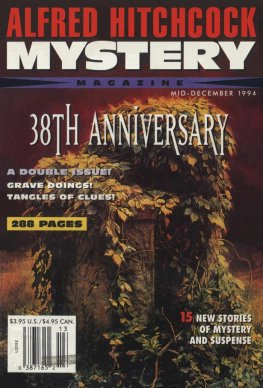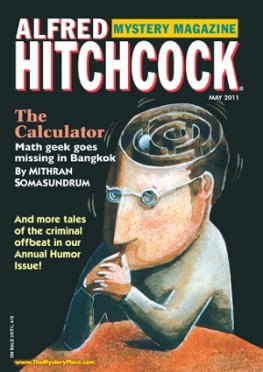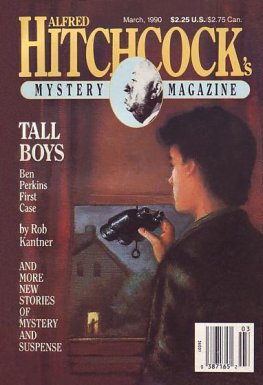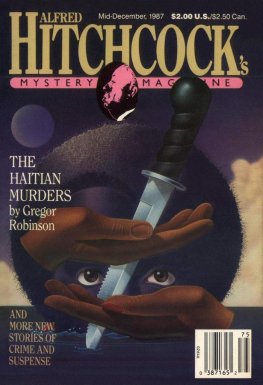Dzhejms Holding - Alfred Hitchcock’s Mystery Magazine. Vol. 24, No. 3, March 1979
Here you can read online Dzhejms Holding - Alfred Hitchcock’s Mystery Magazine. Vol. 24, No. 3, March 1979 full text of the book (entire story) in english for free. Download pdf and epub, get meaning, cover and reviews about this ebook. City: New York, year: 1979, publisher: Davis Publications, genre: Detective and thriller. Description of the work, (preface) as well as reviews are available. Best literature library LitArk.com created for fans of good reading and offers a wide selection of genres:
Romance novel
Science fiction
Adventure
Detective
Science
History
Home and family
Prose
Art
Politics
Computer
Non-fiction
Religion
Business
Children
Humor
Choose a favorite category and find really read worthwhile books. Enjoy immersion in the world of imagination, feel the emotions of the characters or learn something new for yourself, make an fascinating discovery.
- Book:Alfred Hitchcock’s Mystery Magazine. Vol. 24, No. 3, March 1979
- Author:
- Publisher:Davis Publications
- Genre:
- Year:1979
- City:New York
- ISBN:0002-5224
- Rating:5 / 5
- Favourites:Add to favourites
- Your mark:
- 100
- 1
- 2
- 3
- 4
- 5
Alfred Hitchcock’s Mystery Magazine. Vol. 24, No. 3, March 1979: summary, description and annotation
We offer to read an annotation, description, summary or preface (depends on what the author of the book "Alfred Hitchcock’s Mystery Magazine. Vol. 24, No. 3, March 1979" wrote himself). If you haven't found the necessary information about the book — write in the comments, we will try to find it.
Alfred Hitchcock’s Mystery Magazine. Vol. 24, No. 3, March 1979 — read online for free the complete book (whole text) full work
Below is the text of the book, divided by pages. System saving the place of the last page read, allows you to conveniently read the book "Alfred Hitchcock’s Mystery Magazine. Vol. 24, No. 3, March 1979" online for free, without having to search again every time where you left off. Put a bookmark, and you can go to the page where you finished reading at any time.
Font size:
Interval:
Bookmark:
Alfred Hitchcocks Mystery Magazine. Vol. 24, No. 3, March 1979

Dear Reader:
Murphys Law is an axiom of engineers and scientists that states: If anything can go wrong, it will. Several of this issues stories take their themes from Murphys Law.
In Murphys Day by Ernest Savage, detective Sam Train gets involved in a mixed-up kidnapping case thats full of surprises. A number of things go wrong for Barry N. Malzbergs hero in The Appeal, many of them cards that fall wrong and horses that dont run right. The Right Circumstances dont always lead to the best consequences, as we find in Robert Edward Eckels story. Some lives take a wrong turn in John Lutzs The Music from Downstairs. Actors dont always learn their lines, but the actors in William Bankiers Rocks Last Role have an even worse problem.
The Hummelmeyer Operation might fall victim to Murphys Law in James Holdings story. And several characters could be said to share a Murphys Day in T. M. Adams A Garden Full of Snow.
Good reading.
Alfred Hitchcock
Cork Against the Hulks
by S. S. Rafferty

Of all the ridiculous escapades in which Cork has involved us over the years, not one could surpass our present predicament. Bad enough all those wasted years we spent gadding about these colonies in the clutch of his depraved desire to solve crimes. Bad enough that he let hang slack the accumulation of a vast mercantile fortune ready at hand for the taking. Bad enough that I, Wellman Oaks, a conscientious yeoman, have had to suffer his dalliances balls in Charles Town, Boston Town, Philadelphia, and New York; ladies of frippance hither and yon; coursing events; pok-ar; duels (husbands); endless buckets of oysters and tankards of Apple Knock. Now he has a new fascination. Cork has a war.
It is our financial ruin, this Revolution. Gone The Hawkers, a fine trading vessel now prowling about as an American capital ship. Gone the talc works and the choklit factory. By Jehovah, even the worthless copper mine up on the Hudson is in the hands of the British troops. Probably using it as a necessary, and rightly so.
Its all John Jays fault, damn his eyes. When the separation hostilities started, he dangled a carrot before Captain Jeremy Corks nose which he couldnt resist.
Certainly you could raise a regiment of your own, he cajoled Cork that night back in 76. We were in Philadelphia and had just settled the Declaration Plot affair, probably the most important case in Corks career as a detector. Oh, Cork was high in the stirrups, I can tell you. As full of himself as a six-foot-six man can get. But you have demonstrated an uncanny sense of spione, Jay the Tempter went on. Field intelligence will be the crux of this war, and youre the man for it, sir. Youre a woodsman, a mariner, a shrewd logician and student of the human condition.
Corks chest was poutering like a pigeon in love. Damn fool. In love with himself. Spying, indeed!
I think it was Jays use of the title spymaster that lured the lamb into the chute.
Full control? Cork asked.
Jay blanched. Well, within reason. You report directly to me, not Washington.
There you have it. These rebels would well fit into the obscene subtleties of a French court on any given day. That was months ago, maybe a hundred years ago, or seemingly so. In that time, Washington has managed to lose every military encounter, despite Corks ardent supply of information from his network of informants. In fact, Cork seems better organized for war than most of the senior Continental officers.
Everything we do is secret. Half the time I dont know where we are or Im told to forget it if I do. So my vagaries should be excused. I can tell you that, as of this writing, we were exactly thirty-five miles from New York by cade mecum calculation. It was summer, as unbearably hot a summer as Long Island has ever had. The safe house where Cork had set up his clandestine headquarters was fronted by a forgotten trail and backed by salt-sanded beach.
I aroused on an August morning which was already proving to be a hotted blister on this earths skin to find him huddled like a cold man at the rude table which served as our eating board, work table, and, twice, as a surgery slab for wounded agents.
He was looking at maps. Number 7, a redheaded Irishman in his thirties, sat across from him. All of them have numbers rather than names, dont ask me why but Jay is impressed. (The workies name is Reilly, and a bit of a lout.) Each agent, in addition to a number, has an identifying password in Injun jabber.
Good morning, I said convivially. Cork grunted something and Number 7 sat suspiciously mute.
Youre sure? Cork demanded of him.
As sure as I am of me own mother, Captain. They brought The Angels crew in last Tuesday.
The full crew? No casualties?
Far as I can gather. The Angels officers have been paroled, of course, but you said you was only interested in the crew.
Correct.
I poured a cup of small beer and sauntered over to the table. The maps were crude, but the details were not beyond me, mostly because Number 7 had bothered, spy that he was, to mark it Wallabout Bay.
I know the area well. Wallabout Bay is a belly of water that hangs off the East River in the upper reaches of Brooklyn. The old-time Dutchmen called it Wale Bogt, with good reason. At low tide, it is nothing more than a large expanse of mud flats, stench, and skeeters.
In 76, the area was an American stronghold; then, on an August morn such as this one of which I write, Howes army poured ashore and devoured Long Island like carpenter ants spelling doom to all New York. The Wallabout was now a graveyard for British prison hulks.
Number 7 was tracing a line with a grimy finger. Eres the channel at low tide, Captain.
Yes, I know. The British call it The Wintering now.
There are nine of em moored along the channel.
Cork squinted his eyes in thought as if to squeeze facts from his prodigious memory. Nine? Then one is new. He ticked them off on his fingers. Whitly, Scorpion, Prince of Wales, John, Stromboli, Good Hope, Falmouth, and Hunter.
And now the Jersey, Cap. She be the outermost ship in the southern curve of the channel.
Aha, thats good news.
I was appalled. Good news? Another hellhold is good news?
No, Oaks, my joy is that a sixty-four-gun ship of the line no longer has fangs.
The problem, Cap, is which hulk Vs in.
It s the Jersey, you can be sure of it. The other ships in the south channel Good Hope and Falmouth are hospital ships. Hospital ships, he scoffed, a typical English euphemism. Hes in the Jersey, all right.
Whoever this mysterious person was, my heart went out to him. A British prison ship is a foul purgatory. Living on two-thirds rations of weevilly biscuits, putrefied salt pork, and suet creates horrors in the body. Locked below decks in leaking vessels breathing dank air makes death attractive. Many an American sailor or soldier has so died a slow death in the bowels of these ships which, ironically, are dead themselves.
Cork concluded his business with Number 7 with blunt dispatch, ordered me to give him five pounds, dismissed the man, and returned to brooding over the map. Back in the old days, when he took on the solution of social puzzles for the sport of it, I used to rankle him with chidement. But now I hold my tongue, for he is fiercely committed to the damnable war. And besides, there is nothing left to prod him about, since we have lost every pound and half joe he ever had. Oh, to be sure Washington begs the Congress for salary advances for officers, the privateers take a healthy cut of their prize money, and the field troops simply go home if they are not paid. But Cork insists on serving
Font size:
Interval:
Bookmark:
Similar books «Alfred Hitchcock’s Mystery Magazine. Vol. 24, No. 3, March 1979»
Look at similar books to Alfred Hitchcock’s Mystery Magazine. Vol. 24, No. 3, March 1979. We have selected literature similar in name and meaning in the hope of providing readers with more options to find new, interesting, not yet read works.
Discussion, reviews of the book Alfred Hitchcock’s Mystery Magazine. Vol. 24, No. 3, March 1979 and just readers' own opinions. Leave your comments, write what you think about the work, its meaning or the main characters. Specify what exactly you liked and what you didn't like, and why you think so.

